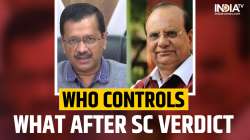SC verdict on Centre Vs Delhi govt: Now Kejriwal controls these services; what L-G has in his reign
Supreme Court drew lines so that the power tussle between the Delhi government and the L-G gets settled. However, it is interesting to see the next move of L-G who virtually lost power to the Kejriwal government.

Delhi L-G Vs Kejriwal govt: Delhi chief Arvind Kejriwal on Thursday hailed the Supreme Court's verdict on the Centre-Delhi services terming the verdict a "victory of democracy". Now, the Supreme Court made it clear that the elected government is the boss when it comes to running the administration.
Legislative and executive powers over services with govt: SC
In a unanimous verdict, the Supreme Court ruled that the Delhi government has legislative and executive powers over services.
Welcoming the verdict, the AAP said in a tweet in Hindi, "The elected government will have the power of transfer-posting of officers. Officers will work only through the elected government."
Elected govt needs to have control over administration: SC
Hearing the Centre versus the Delhi government case over the demarcation of power, a constitution bench headed by Chief Justice DY Chandrachud said an elected government needs to have control over the administration. It refused to agree with Justice Ashok Bhushan's 2019 judgment that the city government has no power over the issue of services. The constitution bench was set up to hear the legal issue concerning the scope of legislative and executive powers of the Centre and the National Capital Territory government over control of services in Delhi.
Now, the million-dollar question is what does the SC verdict mean for the Delhi government? Who is now the boss of Delhi- CM Kejriwal or L-G VK Saxena?
Now, Delhi government will have control over these services-
The Supreme Court held that the Delhi government would have all rights related to services and administration except in areas outside its legislative powers.
The right of posting and transfer of officers will be with the Delhi government.
The L-G will have to accept the advice of the government.
The Delhi government will be able to decide on the posting and transfer of officers on its own.
The Delhi government will not need to take the L-G's approval for every decision it makes. Like other states, the Lieutenant Governor will have to follow the advice of the government.
Now the elected government will be able to make laws on the issues on which there is no central law.
What's for the Centre
The authority of police, public order and land will remain with the Centre. The L-G cannot have comprehensive administrative powers on all issues related to Delhi, said SC. The L-G's powers do not give him the right to interfere with the legislative powers of the Delhi Assembly and the elected government
What's ahead in Centre Vs Delhi govt?
The central government can file a review petition against the Supreme Court ruling. The Centre has one more option. It can make a law in the Parliament regarding powersharing in Delhi. However, the new law can again be challenged in the apex court.
GNCTD Act, 1991 & powersharing battle
The Centre had tweaked the Government of National Capital Territory of Delhi (GNCTD) Act, 1991, by amending in in the Parliament in 2021. The amendment provided a new framework for the functioning of the Legislative Assembly and the government in Delhi and it also gave some additional powers to the L-G. It was mandatory for Delhi government to take the opinion of L-G for any decision. It was this amendment that propelled the Kejriwal government to move Supreme Court.
(With agency input)
Also read: Major reshuffle on cards: Arvind Kejriwal after SC ruling on Centre-Delhi services row